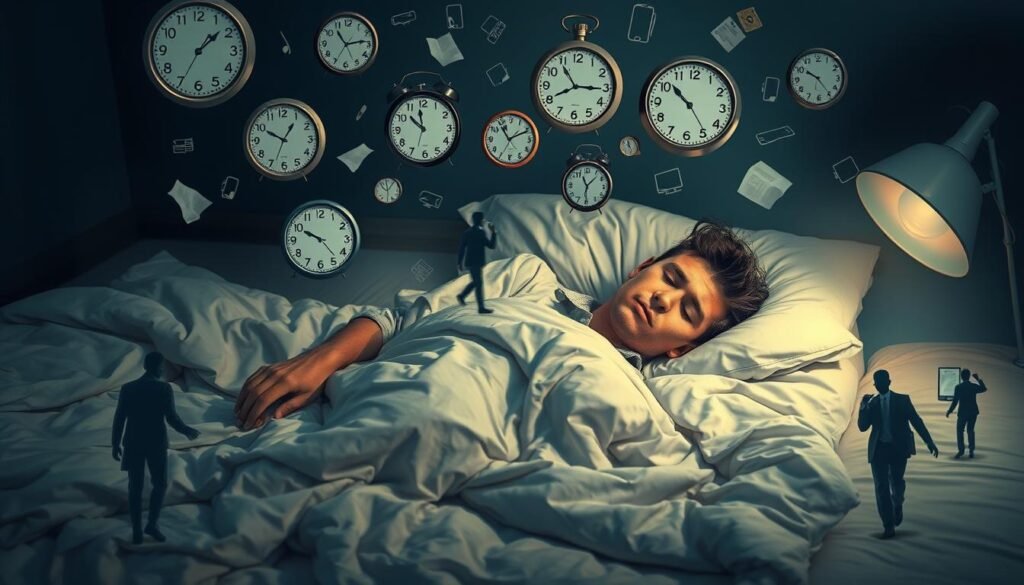About 5% of people with insomnia have paradoxical insomnia. They feel like they haven’t slept enough, even when they have. This confusing and frustrating condition can last for months or years. But there are effective ways to deal with it.
This guide will tell you how to handle paradoxical insomnia. You’ll learn to spot symptoms, find out what causes it, and see different ways to fix your sleep. With the right approach, you can enjoy peaceful nights again. There’s hope with strategies and insomnia treatments.
Key Takeaways
- Paradoxical insomnia is a condition where individuals feel they are sleep-deprived despite sleeping adequately.
- It can persist for months or years, impacting overall daily functioning.
- Treatment options may include medications, psychotherapy, and sleep education.
- Cognitive Behavioral Therapy for Insomnia (CBT-I) is often recommended.
- Patients can benefit from better sleep strategies involving relaxation techniques and improved sleep hygiene.
Understanding Paradoxical Insomnia
Paradoxical insomnia is a unique sleep disorder, also known as subjective insomnia. This condition makes people believe they haven’t slept, even if they actually have. Studies prove there’s a big difference between how long they sleep and how they feel about their sleep. This impacts how they handle their sleep routines.
Definition and Description
Subjective insomnia means people feel they hardly sleep, no matter how tired they are. Yet, sleep tests show they get enough rest. People with paradoxical insomnia think it takes ages to fall asleep. They also feel they sleep less than they do. Younger folks might experience this more, showing how our minds can see sleep differently than what’s happening in our bodies.
Difference Between Paradoxical and Chronic Insomnia
Knowing the difference helps manage sleep better. Chronic insomnia lasts over three months and messes with sleep patterns. This leads to trouble in day-to-day life. But paradoxical insomnia, a form of chronic insomnia, doesn’t affect daily life in the same way. People feel awake all night, even though they aren’t truly experiencing insomnia.
| Criteria | Chronic Insomnia | Paradoxical Insomnia |
|---|---|---|
| Duration | At least 3 months | At least 3 months |
| Sleep Perception | Actual sleep disturbance | Subjective belief of no sleep |
| Awareness During Sleep | Impaired awareness | Full awareness |
| Impact on Functioning | Significant impairment | No expected impairment |
| Research Findings | Associated with various disorders | Linked to mental health issues |
Symptoms of Paradoxical Insomnia
People with paradoxical insomnia face many challenges. This condition impacts their sleep quality and wellbeing.
Common Experiences and Feelings
Those with this insomnia often don’t feel rested after sleeping. They are overly aware at night, causing them to wake up often. This leads to feeling very tired during the day.
They might worry about their sleep issues a lot. This can make it hard to focus during the day. Feeling this way can also increase their stress and anxiety.
Effects on Daily Life
Paradoxical insomnia affects life beyond sleep. It can hurt social and work performance. People may feel cranky and less driven, impacting their relationships and jobs.
This situation makes daytime tiredness worse. It becomes hard to enjoy a balanced life. Thus, getting the right treatment is vital for better sleep.

| Symptom | Impact on Life |
|---|---|
| Feeling unrefreshed | Decreased motivation and productivity |
| Awareness of surroundings | Frequent irritability and mood swings |
| Excessive daytime sleepiness | Difficulties in concentration and focus |
| Ruminating thoughts | Increased anxiety and stress levels |
What Causes Paradoxical Insomnia?
Studying paradoxical insomnia, we’re still learning why it happens. Researchers believe changes in how the brain works are crucial. Brain scans show differences in areas linked to sleep, like the nucleus accumbens and amygdala. Because of these changes, people might feel they’re not sleeping when they actually are.
Possible Brain Function Changes
People with this sleep issue often have more brain activity at night. This includes alpha, beta, and gamma brain waves. It makes them feel too alert when they should be sleeping. This wrong feeling of not sleeping is linked to their brain’s structure, especially in the thalamus and hippocampus.
Psychiatric Conditions and Their Link
Paradoxical insomnia is often found with mental health issues. It’s common among those with bipolar disorder, schizophrenia, and alcohol dependence. Anxiety worsens it, making people think they take longer to fall asleep and sleep less than they do. This worry over sleep makes treating the condition harder.

| Brain Area | Function | Role in Paradoxical Insomnia |
|---|---|---|
| Nucleus Accumbens | Reward Processing | Altered dopamine signaling may affect sleep perception. |
| Hippocampus | Memory and Learning | Changes could affect memories related to sleep experiences. |
| Thalamus | Sensory Relay | May contribute to heightened sleep disturbances. |
| Amygdala | Emotional Regulation | Heightened anxiety levels may lead to sleep perception distortion. |
Diagnosis of Paradoxical Insomnia
Diagnosing this type of insomnia requires understanding one’s sleep habits. Sleep studies are key, offering data on actual versus felt sleep. By examining brain waves, heart rate, and breathing, doctors can accurately confirm or dismiss paradoxical insomnia.
Importance of Sleep Studies
Sleep studies are crucial for identifying paradoxical insomnia. They help doctors look into how well and efficiently someone sleeps. People might feel tired even if they sleep more than 6.5 hours. If sleep efficiency is 85% or more, it could mean sleep state misperception. These evaluations also catch other potential sleep issues.
Actigraphy as a Diagnostic Tool
Actigraphy offers an easier way to diagnose this insomnia. It uses a small device to record sleep patterns at home. This is handy when more complex tests are not possible. Though not as detailed as other studies, actigraphy still sheds light on one’s sleep habits, aiding diagnosis.

Treatment Options Available
There are various ways to treat paradoxical insomnia, but there’s no one-size-fits-all solution. People with this condition try many strategies. These include using medicines and psychotherapy to get better sleep.
Medications commonly used
Insomnia meds can help you sleep better for a while. Around 2 to 6 percent of adults use them. They choose from prescription drugs and ones you can buy without a prescription. Popular choices are:
- Melatonin: A hormone that helps control your sleep cycle.
- Zolpidem: A top choice for helping you fall asleep.
- Over-the-counter sleep aids: About 25 percent of people with insomnia try these, often several times a week.
Even though some meds can help you sleep, they’re not the best for long-term use. There are risks like becoming dependent on them and having withdrawal.
Psychotherapy and Lifestyle Changes
Cognitive Behavioral Therapy for Insomnia (CBT-I) is highly recommended for lasting insomnia issues. CBT-I targets the thoughts and behaviors that affect sleep. It’s effective for different causes of sleep trouble. Usually, 6 to 8 sessions are needed.
Making changes to your lifestyle also improves sleep. Steps to take include:
- Keeping the same bedtime and waking up time.
- Avoiding daytime naps.
- Only using the bed for sleep and intimacy.
- Limiting alcohol and caffeine before bed.
- Staying active regularly.
With the right mix of psychotherapy and lifestyle tweaks, you can tackle paradoxical insomnia from all angles. This approach helps create a sleep-friendly setting.
| Treatment Type | Details | Considerations |
|---|---|---|
| Insomnia Medications | Melatonin, Zolpidem, OTC Sleep Aids | Temporary relief; risk of dependence |
| CBT-I | Focuses on cognitive and behavioral strategies | 6-8 sessions for effectiveness |
| Lifestyle Changes | Consistent sleep schedule, physical activity | Promotes long-term sleep quality |
How to Treat Paradoxical Insomnia
To manage paradoxical insomnia, we use strategies that tackle both mind and behavior aspects. We often suggest Cognitive Behavioral Therapy for Insomnia (CBT-I), sleep restriction therapy, and stimulus control methods.
Cognitive Behavioral Therapy for Insomnia (CBT-I)
CBT for insomnia stands as the top recommendation for those dealing with paradoxical insomnia. It aims to change negative views related to sleep. By doing so, it helps improve how one perceives sleep and reduces the worry about not sleeping, leading to better sleep patterns. It also incorporates approaches like paradoxical intention, which helps remove the stress of trying to sleep and thus improves sleep.
Sleep Restriction Therapy Explained
Sleep restriction therapy shortens the time you spend in bed to align with how much you actually sleep, aiding in better sleep continuity. This process encourages your body to adapt, enjoying more solid and refreshing sleep. It involves strict monitoring of sleep habits, using techniques like polysomnography to analyze sleep quality and length accurately.
Stimulus Control Techniques
Stimulus control techniques work to make your bed a cue for sleep, reducing the time you’re awake in bed. Key tactics include hitting the sack only when sleepy, keeping pre-sleep activities calm, and limiting bed use to sleeping. These steps can greatly lower sleep-related stress, making for a sleep-friendly environment.
To fully grasp the best insomnia treatments, explore various treatment methods for insomnia. These options range from meds to behavior therapy, tailored to fit each person’s unique situation.
| Treatment Method | Description | Benefits |
|---|---|---|
| CBT for insomnia | Psychological therapy focusing on changing negative thoughts about sleep. | Improves perception of sleep, reduces anxiety. |
| Sleep restriction therapy | Limits time in bed to actual sleep duration. | Enhances sleep quality and consolidation. |
| Stimulus control techniques | Establishes a strong association between bed and sleep. | Reduces wakefulness and sleep anxiety. |
Practicing Sleep Hygiene
Good sleep hygiene can greatly improve sleep for those battling paradoxical insomnia. To get restorative sleep, it’s crucial to have a good sleeping environment and healthy sleep habits.
Creating a Sleeping Environment
A good sleeping environment is very important. Things like light, noise, and temperature affect how well we sleep. To sleep better, consider these tips:
- Keeping the bedroom dark, using blackout curtains or eye masks.
- Maintaining a cool temperature, ideally between 60°F to 67°F.
- Eliminating noise sources or using white noise machines to mask disturbances.
Using these sleep hygiene tips can improve sleep quality. A bedroom without distractions helps you relax and sleep well.
Developing Healthy Sleep Habits
Having healthy sleep habits is key to fighting insomnia. Try these strategies:
- Maintaining a consistent sleep schedule by going to bed and waking up at the same time every day.
- Avoiding stimulants like caffeine or nicotine before bedtime.
- Being active during the day, ideally in the morning.
- Doing calming activities before bed, like reading or stretching.
It’s important to keep an eye on your sleep habits. Keeping a sleep diary can help spot problems and better your sleep hygiene. Following these tips can really help ease insomnia symptoms. This shows how closely mental health and good sleep are linked. For more on insomnia treatment, check this source.
Relaxation Techniques and Mindfulness
Those dealing with paradoxical insomnia often get relief from relaxation methods. Mindfulness meditation helps reduce anxiety and improves sleep awareness daily. It teaches people to accept their sleeping experiences, easing frustration and anxiety.
Benefits of Mindfulness Meditation
Mindfulness meditation is a strong method for battling insomnia. It focuses on the present moment without judgment, making sleep struggles easier to accept. Just ten minutes of mindfulness a few times a day makes the mind calmer. This calmness can decrease anxiety and boost sleep quality.
Progressive Muscle Relaxation and Other Methods
Progressive muscle relaxation is another way to lower stress. It involves tightening and then relaxing muscles, which relaxes the body. Doing these exercises can lower blood pressure, slow heart rate, and reduce stress hormones. Such changes help calm the mind and improve sleep.
Using these relaxation methods helps control emotions and stop racing thoughts at night. Tools like sleep meditation apps also help with insomnia, making sleep better. For more help, cognitive-behavioral therapy for insomnia is effective too. Learn more at Cognitive Behavioral Therapy for Insomnia.
Conclusion
Understanding paradoxical insomnia is complex but very important. People dealing with it often need different kinds of help. This includes doctor’s care and changes in daily habits. Studies show that treatments like olanzapine and risperidone can really help. They prove that the right treatment plan can improve sleep.
This summary shows why specialized care is critical. It often involves therapy, better sleep habits, and sometimes medicine. Adding these strategies to your life can ease symptoms a lot. It can also make you feel better overall. For those facing this tough condition, getting help from a professional is key.
Paradoxical insomnia is more common than some think. This means more people need to learn about it and get treatment. By focusing on education and holistic treatment, people can get better. They can enjoy the benefits of sleeping well again.